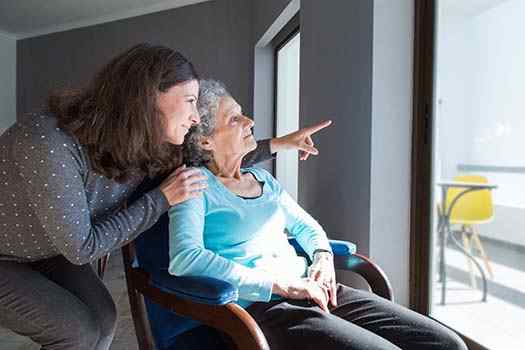The typical Alzheimer’s diagnosis comes when a person is in the early to middle stages of the disease. In many cases, a person may continue to live as long as ten years after the diagnosis, and some people have survived for more than 20 years. Early treatment and some simple lifestyle changes can help seniors live as long as possible. Knowing what to expect during the late stage of Alzheimer’s and how long it can last allows you to develop appropriate strategies to ease your aging loved one’s symptoms.
How the Stages Overlap
If you’ve recently begun to learn about Alzheimer’s disease, you’re likely diving into research regarding what happens during each stage. Although each stage is marked by specific symptoms, it’s important to realize the stages have some overlapping challenges that must be overcome. In some cases, seniors may be in the middle stage of Alzheimer’s when they have difficulty with things such as being unable to remember to eat without being reminded. Being proactive in these earlier stages helps you set up strategies that make moving into the later stage easier.
Family caregivers can benefit a great deal from the assistance of a professional caregiver with specialized training in Alzheimer’s care, which includes unique methods designed to boost cognitive health. The type of elderly home care seniors need can vary. Some need assistance a few hours a day, while others require more extensive around-the-clock assistance. At Embrace In-Home Care, we tailor our care plans based on each senior’s individual care needs, and the plans can be adjusted at any time.
The Typical Length of the Last Stage
On average, the final stage of Alzheimer’s disease lasts two to three years. However, keep in mind this stage is unpredictable, and people tend to progress through it at varying paces. Seniors who are already healthy tend to do the best during this stage, although you should know that it can be challenging for caregivers. Your loved one may also experience some periods when he or she gets better before facing difficulty with parts of the daily routine again, which makes it difficult to know what will happen from day to day.
What You Can Do to Make Things Easier
As a general rule, it’s best to have more help than you might think you need during the last stage of Alzheimer’s disease, because your loved one’s health can change with very little notice. For instance, your loved one may be eating fine until one day, he or she suddenly has difficulty swallowing. Alternatively, you may feel capable of handling your loved one’s care and then find it impossible if you get sick. To make things easier, set up a network of support. In addition to your family members, seek out professional caregivers who are experienced with helping people during the final stage of Alzheimer’s disease.
Caring for a senior loved one can be challenging for families who don’t have expertise or professional training in home care, but this challenge doesn’t have to be faced alone. Family caregivers can turn to Green Valley Home Care Assistance for the help they need. We provide high-quality live-in and respite care as well as comprehensive Alzheimer’s, dementia, stroke, and Parkinson’s care.
Ways to Manage Your Emotions
The last stage of Alzheimer’s is so demanding that it’s easy to neglect your own emotional needs. As a family caregiver, it’s difficult to watch your loved one when he or she is in a state of decreasing health, and you may be experiencing feelings of grief and loss. Make taking time out for yourself a priority, and lean on the people around you for emotional support. While these may be challenging days, they’re an opportunity to honor your loved one by showing him or her how much you care.
Alzheimer’s can be challenging for seniors to manage without assistance, and it can be just as challenging for families who don’t have experience in providing Alzheimer’s care. Green Valley Embrace In-Home Care provides Alzheimer’s care seniors and their families can depend on. Our proprietary Cognitive Therapeutics Method was designed to help seniors with Alzheimer’s and other memory-related conditions live happier and healthier lives. Schedule a free in-home consultation by giving us a call today at (520) 625-2050.
